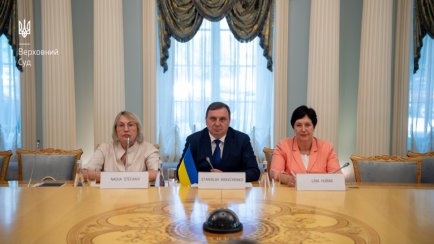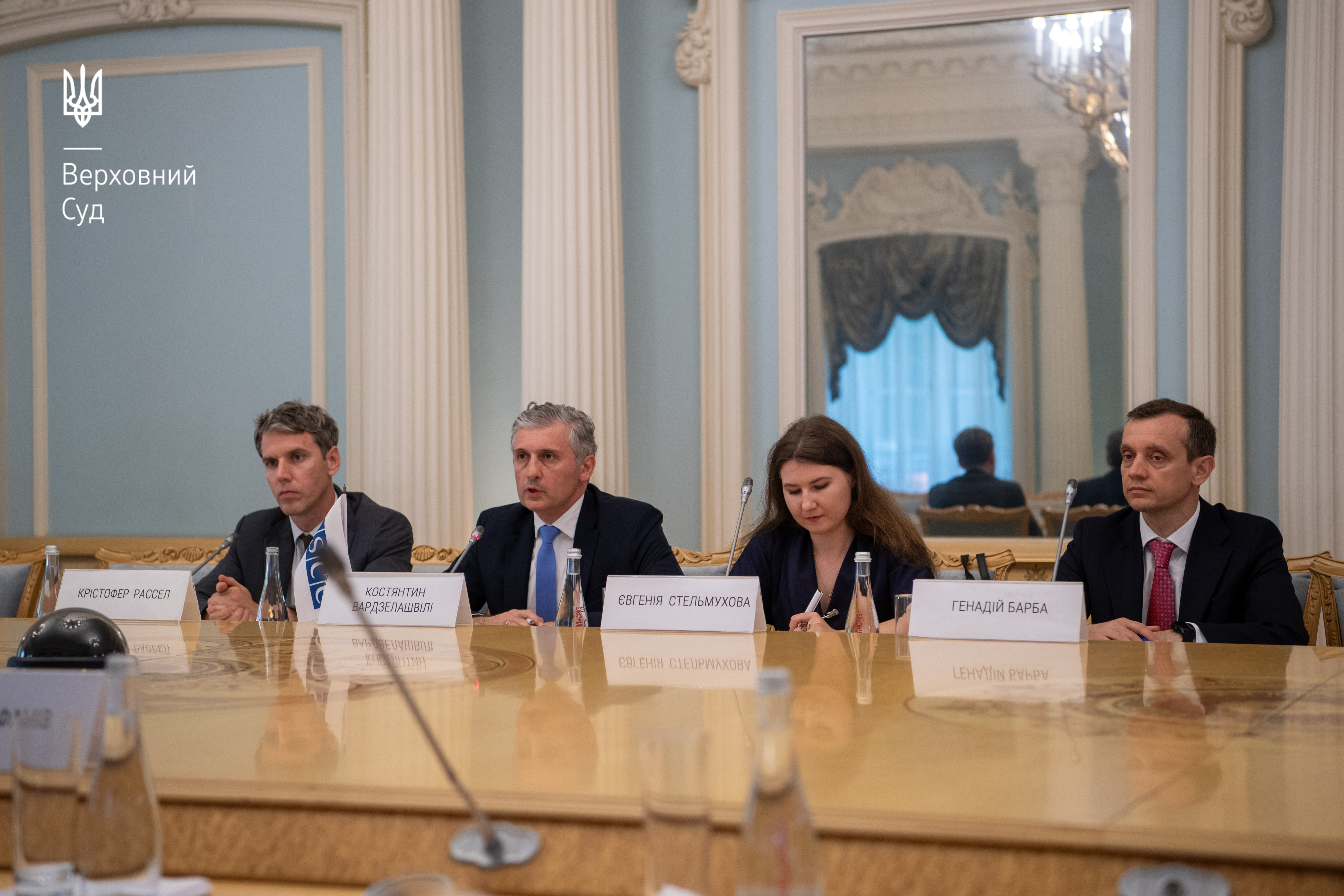Contact center of the Ukrainian Judiciary 044 207-35-46

In the context of Russia's full-scale invasion of Ukraine, Ukrainian judges continue to fulfil their main task of administering justice. Representatives of the legal community are aware that if there is no justice and the judicial system does not function, our state is unlikely to be a full-fledged democratic country.
This was emphasised by Stanislav Kravchenko, President of the Supreme Court, during a working meeting with representatives of the OSCE Office for Democratic Institutions and Human Rights, which was dedicated, in particular, to discussing the work on the future guidelines for dealing with war crimes.
Thanking the international partners for their ongoing cooperation and initiative in holding the meeting, the President of the Supreme Court noted that under martial law, the most important area for the Ukrainian judiciary remains the consideration of war crimes, including in the context of legal issues related to the collection of evidence.
According to Stanislav Kravchenko, out of 135,000 registered crimes of aggression and war crimes, about 2,000 criminal proceedings have been submitted to national courts. Most of the cases in this category have been considered by the courts of first and appellate instances, and 11 of them have been reviewed in cassation. This number of cases allows us to shape the relevant judicial practice right now. As an example, the SC President told ODIHR representatives about the Supreme Court's conclusions on the application of Articles 437 of the Criminal Code of Ukraine "Planning, preparation, initiation and waging of aggressive war" (Resolution of the Grand Chamber of the Supreme Court of 28 February 2024 in case No. 415/2182/20), 438 of the Criminal Code of Ukraine "Violation of the laws and customs of war" (Resolution of the Criminal Cassation Court of the Supreme Court of 28 February 2024 in case No. 753/14148/21) and part 3 of Art. 110 of the Criminal Code of Ukraine "Encroachment on the territorial integrity and inviolability of Ukraine" (Resolution of the Criminal Cassation Court of the Supreme Court of 30 May 2024 in case No. 127/26784/22).
"It is important for us to have the international community's assessment of such judgments of the Supreme Court, in particular, the application of the in absentia procedure, i.e. the consideration of a case in the absence of the accused. With this in mind, the areas of further cooperation with ODIHR include harmonisation of national legislation with international law, resolution of procedural issues in line with the provisions of the Convention for the Protection of Human Rights and Fundamental Freedoms, etc.", Stanislav Kravchenko said.
On behalf of ODIHR, Konstantine Vardzelashvili, Head of the Democratisation Department, thanked the Supreme Court for its active cooperation and expressed his admiration for Ukrainian judges who remain committed to their work despite the challenges of wartime. "Our visit to Kyiv and the Supreme Court is a manifestation of solidarity with the Ukrainian people in general and the Ukrainian judiciary in particular. It is a sign of respect for the entire judicial community of your country," he said.

As Mr. Vardzelashvili emphasised, the case law and experience of Ukraine in war crimes trials outlined by the SC President will be extremely useful for the international community. He assured that Ukrainian judges can count on comprehensive international support, and that cooperation between the Supreme Court and ODIHR will continue to deepen.
Ghenadie Barba, Chief of ODIHR Rule of Law Unit, and Christopher Russell, ODIHR Rule of Law Officer, spoke about the next stage of cooperation - a working group discussion on the subject matter, format, structure and title of the future practical guide (guidelines) for judges considering criminal proceedings related to international/war crimes. "We are encouraged that despite the tight schedule and difficult conditions, Ukrainian judges (even those from frontline areas) are joining this initiative and want to contribute to the preparation of the manual. This demonstrates how important the rule of law is to Ukraine," added Christopher Russell.
Supreme Court Judge of the Criminal Cassation Court Nadiia Stefaniv expressed her belief that national courts should use their decisions in war crimes cases to demonstrate that Ukraine, as a democratic state, respects fundamental human rights and freedoms and democratic principles. In her opinion, this should also be the focus of the forthcoming practical guide, which will include the principles of international criminal and international humanitarian law.
The representatives of the Supreme Court and ODIHR agreed on areas for further cooperation, including consideration of general legal issues from the perspective of international law, monitoring of court hearings as a tool for analysing the efficiency of the judicial system as a whole, and exchange of experience between judges.
The meeting was also attended by Lina Hubar, Head of the Division for International Cooperation of the Supreme Court.